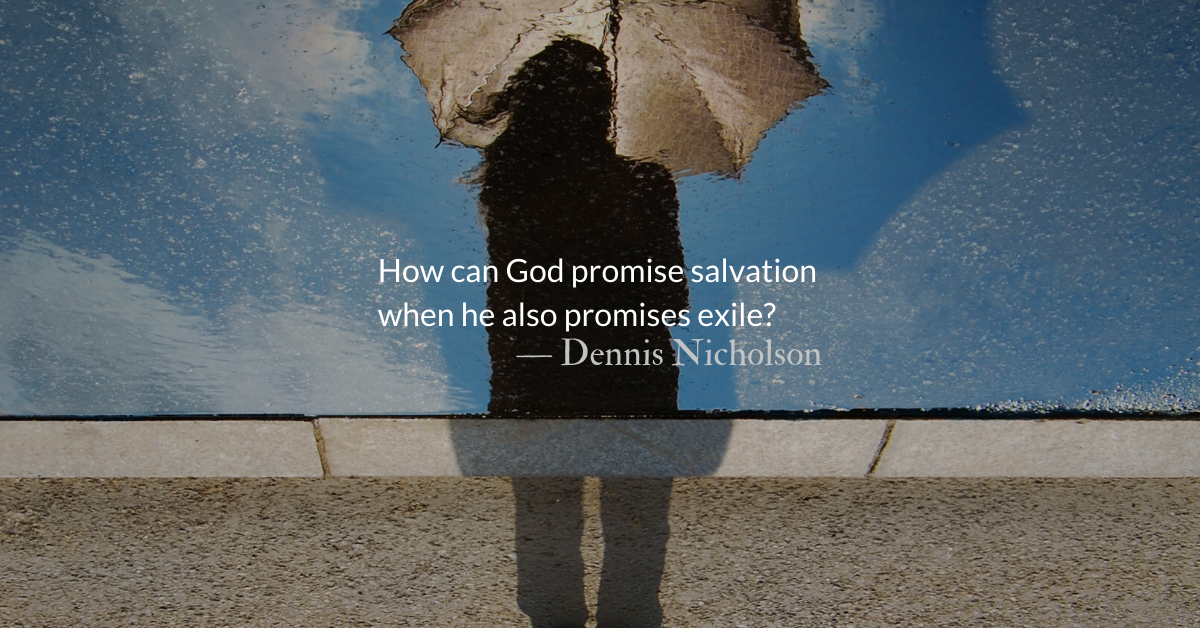Scripture Focus: Isaiah 40.1-2, 9-10
1 Comfort, comfort my people,
says your God.
2 Speak tenderly to Jerusalem,
and proclaim to her
that her hard service has been completed,
that her sin has been paid for,
that she has received from the Lord’s hand
double for all her sins.
9 You who bring good news to Zion,
go up on a high mountain.
You who bring good news to Jerusalem,
lift up your voice with a shout,
lift it up, do not be afraid;
say to the towns of Judah,
“Here is your God!”
10 See, the Sovereign Lord comes with power,
and he rules with a mighty arm.
See, his reward is with him,
and his recompense accompanies him.
Reflection: Someone Must Pay
By John Tillman
When a baseball flies through a window.
When a distracted driver rear-ends a car.
When a phone, knocked to the ground, shatters.
When property is damaged, humans have a common instinct: “Somebody has to pay for that.” If we damage the property, the “somebody,” is us. If someone else damages our property, we seek restitution from them.
Even those who deny God or the Bible have a sense of this kind of justice. They cannot explain these intuitions or ground them in any logical cause, but they have them. The desire for justice is part of our created nature—a sliver of shattered imago dei within.
Sin goes beyond breaking God’s rules carved on stone tablets. Sin harms us, other humans, or God’s world, and for this reason, sin breaks God’s heart. This is why David, who harmed Bathsheba, Uriah, and Joab, says he sinned against God. (Psalm 51.4) This is why David’s line of kings, who crushed the poor, widows, and foreigners and promoted idolatry, grift, and violence, sinned against God. Sin is harm instead of health, poison instead of nutrition, and decay instead of cultivation. Someone must pay.
Shattered glass in windows, automobiles, and phone screens can easily be repaired or replaced. But what if the damage goes beyond cracked glass or bent metal? What about losses that cannot be replaced with an identical item from the shelf of a store? What about harm that is not easily assigned a monetary value? What recompense can we give for even a ruined day, much less a ruined life?
We often use metaphors of payment to discuss sin and salvation. There were earthly “payments” for Judah’s sins. Political and military defeat and exile were coming. But that didn’t pay for it. How could 70 years in exile pay for generations of harm?
We may have earthly consequences we must pay for our sins and failures. But these don’t pay for our sins.
Like Judah, our comfort is that God’s mercy, through Jesus Christ, cancels the sins of the repentant. Jesus brings reward and recompense we could never carry. He restores things we destroyed, repairs things we broke, and repays what we stole.
Join the voice in the wilderness proclaiming good news. (Luke 4.17-21) Speak tenderly of comfort to those harmed. Tell sinful Jerusalems, Judeas, Samarias, and the world to repent and believe the good news. (Luke 24.46-47; Acts 1.8)
For every harm, Jesus paid it all.Music:“Jesus Paid it All” lyrics by Elvina M. Hall, recording by Shane and Shane.
Divine Hours Prayer: The Refrain for the Morning Lessons
Gracious is the Lord and righteous; our God is full of compassion. — Psalm 116.4
– From The Divine Hours: Prayers for Summertime by Phyllis Tickle.
Today’s Readings
Isaiah 40 (Listen 5:09)
Acts 27 (Listen 6:09)
Read more about Treasure in Our Sacks
We come with the false belief that we must buy blessings and the false pride that we have the means with which to do it.
Read more about Unobligated God
But thank God that he pays debts that he does not owe. He is a God who gives when he has no obligation.








